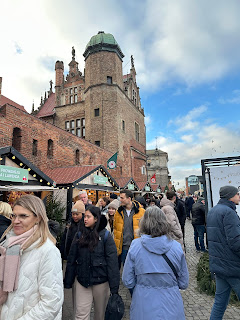This time of year, the big draw in Krakow, is the Christmas Market in the Old Town Square. The Square is a beautiful medieval gathering place, larger than many typical squares in Europe. This time of year it is beautifully decorated for the season and there is much on offer for those eager to spend some zloties. A large number of the booths are arranged inside the 13th Century Market Arcade that sits in the centre of the square. It is a glorious building that has room for dozens of craft and artisan stalls. The market arcade is then surrounded by outdoor booths that sell clothing, xmas ornaments, food and mulled wine.
Apart from the aforementioned market arcade there are other grand edifices flanking the square. Tops among them is St. Mary's Basilica which is a must-see. You can enter by a side door after you buy a ticket in an adjacent building for a few zloties. Once inside you are definitely going to be gobsmacked by the interior. Mr. Gym has visited dozens of outstanding churches in the world but none of them hold a candle to this one, that was home base for Pope John Paul II when he was a lowly Archbishop. Speaking of candles, Gym and his lovely sidekick lit a tall white candle for their granddaughter back home. Also standing in the square is the Wizen Ratuszowa, the City Hall Tower, a very unique structure indeed.
Another reason to visit this part of town is that all of the most highly-rated restaurants in Krakow line the exterior of the Old Town Square. Gym and his companions tried Sorrento's for Italian cuisine and dined on a delicious charcuterie board, salads and some perfectly done home-made pasta. Its high rating is well deserved. The group also had some fancy coffees at Loza Restaurant and Drink Bar and Gym thought that this establishment was underrated. They had great service at Loza's, in a very comfortable setting and the coffees were good too. Other restaurants nearby that Gym would recommend are the highly-rated Padre Restaurant for upscale regional fare and if you crave pirogies and schnitzel, you have to try Pod Wawelem Kompania Kuflowa. For drinks Gym and Mrs. Gym highly recommend the Bar in the Stradom House hotel. This very striking watering hole is in a repurposed 13th Century chapel.
Gym and his adventurers also toured the royal suites at Wawel Castle. They climbed up the hill and spent a nice half-day checking out the posh crib of Polish royalty adorned with priceless art including frescos, tapestry, massive oil paintings, china, jewelry and historical objects. Much of this stuff was actually spirited away to Canada before the Nazis showed up in WW2. And yes, as you would expect, Canada sent it all back.
Roland and Brenda Anderson left Gym and his dear wife on December 5, 2024. There were hugs all the way around and then there were two. On December 6th, Gym and Mrs. Gym spent their last full day in Krakow touring the Wielicska Salt Mine which was excavated from the 13th Century until the 1996. Today it is a very popular tourist attraction with over 1.5 million visitors per year. The tour groups visit several chambers on the first three levels of the mine. Inside the mine there are absolutely beautiful displays carved from rock salt. Some scenes show how the mine was developed in the early days and others display important figures in the development of the mine. However the best chambers are the two chapels that were explored by the intrepid travelers. Incidentally, the tour descended about 800 stairs to the base of the third level and traveled about 5 kilometres underground. There were a few sore muscles later that evening.
Stay tuned!
 |
The old City Hall Tower. It was closed
at the time of Gym's visit. |
 |
| St. Mary's Basilica by day |
 |
| Gobsmacking interior |
 |
| Looking back |
 |
| The square at night |
 |
Ukrainian nationals collecting alms for their
downtrodden brethren back home |
 |
| Wawel Castle china - not dishwasher safe |
 |
| Remarkably detailed service items used by Polish Royals |
 |
| Augustus II (life-size wax) at his coronation |
 |
| Royal crowns and sceptres |
 |
| Wawel castle courtyard |
 |
| St. Mary's by night |
 |
| From Left: Mrs. G, Brenda, Mr. G and Roland |
 |
The Krakow kraken below the castle wall
next to the Vistula river pathway |
 |
| Mine shaft entrance of the Wielicska Salt Mine |
 |
| The Seven Dwarves carved from rock salt |
 |
St. Kinga's Chapel - chandeliers are made of
salt crystal |
 |
| The Last Supper carved in rock salt in St. Kinga's |
 |
| Brine Waterway down in the mine |





















































